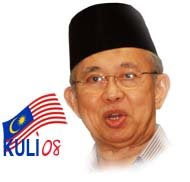SEVEN PRINCELY TIPS
By BARBARA SKADIANG-TEY
Tengku Razaleigh Hamzah
MANY know Tengku Razaleigh Hamzah as the country’s Finance
Minister in the late 1970s to the 80s, but few are aware that
this scion of Kelantanese royalty was once chairman of the
Malaysian Institute of Management (MIM) from 1973 to 1976.
Established on Jan 29, 1966, MIM was initially a society-based
organisation till it was incorporated as a company limited by
guarantee on March 28 1975.
MIM was entrusted with the mandate to raise the level of
managerial competence in Malaysia, enhance and maintain
management standards, and provide a bridging platform for the
free exchange of management knowledge and experience.
“Everyone was highly supportive that MIM should become the
training body of management in Malaysia. Although there were a
shortage of course leaders then, we were able to run the
programmes reasonably well and the response to MIM’s efforts was
very encouraging,” Tengku Razaleigh recalls.
Fate intervened in 1976 when Tengku Razaleigh was appointed
Finance Minister. Now, 30 years later, MIM was able to catch up
with him again and draw seven management tips from the regal
finance and banking aficionado.
Professionalism
A stickler for professionalism, Tengku Razaleigh clarifies, “If
management training were properly facilitated in a more
structured manner, the professionalism in the training would
eventually be reflected in the enterprises managed by these very
people in the future. To imbue a more professional touch into
our management courses, selected trainers were sent for the
necessary training to ensure they were appropriately equipped.”
Having been very involved in banking, Tengku Razaleigh
acknowledges that most of his experiences have revolved around
the management of resources, manpower and money, which were so
scarce in developing countries and companies in the 1960s and
1970s.
Therefore, he remembers, it was very difficult to find highly
trained management professionals, except in established
organisations such as ICI, Shell and the other major trading
agencies.
Tengku Razaleigh believes that people, generally, are capable of
devoting their time to managing resources, but first they must
possess the spirit of sacrifice.
Good managers, he observes, are willing to give their all to not
only absorb but also contribute as much knowledge as possible to
properly manage their respective departments.
He adds, “Managers must manage as prudently as possible and be
prepared to work long hours. In those days we used to start work
at 7.30am and work until 11pm.
“We were so short-staffed, even new recruits had to stay back
and learn on the job. There was no equipment to help managers of
our generation. But when we started Bank Bumiputra, we were one
of the first to introduce computers into the banking industry.”
Decades ago, many came into the organisation because their
parents were there before and they were encouraged to join as
well, says Tengku Razaleigh.
“They learned mostly by trial and error, unlike today where
people are more professionally trained, are attuned to the
changing times and have plenty of guidelines to follow.
“In the banking profession, having a good family background is
important because it means the person will hold on to his family
values and it won’t be so easy for them to deviate from the
values they uphold, unless of course they are beset by problems
or choose to live beyond their means.”
However, Tengku Razaleigh admits that human weakness appears to
be more prevalent in part due to technology.
Like a double-edged sword, technology enables us to learn things
more quickly, yet enables some to emulate bad examples more
easily. Fortunately, he notes, the low percentage of bad
managers falls within manageable limits.
TIPS 1: The future of the enterprise is reflected in the
training given to its managers.
2: Good managers fundamentally possess the spirit of sacrifice.
3: Manage prudently for the future but labour like there’s no
tomorrow.
4: Technology is a double-edged sword – through it good managers
receive knowledge more quickly but bad managers deceive more
easily!
5: Whether or not you are in the profession of your heart’s
desire, acquire both formal and informal training to enhance
your competence, he advises.
6: With technology and globalisation, no management problem
remains irresolvable – there is always help available from
somewhere.
7: There is always someone who is one up on you. So never stop
learning; keep striving for your best.
Choices
Asked about his analysis of management evolution from the 1960s
till now, Tengku Razaleigh opines that today’s young managers
have far greater professional choices than their predecessors
ever had.
“Today, those who become part of the management team are the
ones who have been given the opportunity to acquire an
education. They are able to pick the profession they really want
although a few might grab what is available due to a lack of
options.
“Even so, once they land the job, they must try to acquire
formal and informal training to gain greater expertise
especially with the innumerable sophisticated tools available
today.
“It now becomes a race as to whether these managers have made
the grade or whether they have chosen the right profession in
the first place.”
“Fortunately for many, they can still change midstream if they
find something more suitable in the future. There is no shortage
of opportunities for young managers who are knowledgeable and
well trained. I can see this tremendous growth today especially
in the field of management.”
Informed intuition
A chairman, according to Razaleigh, has to stay one step ahead
of everyone below him.
“There was hardly anything like mentorship or advisory services
then. It was mostly using one’s common sense and guided purely
by intuition, and it was usually very personal; the most was
you’d ask your neighbour for advice, that’s all.
“I think Malaysian managers are sufficiently exposed to be
global in their mindset even for those during my generation.
“Many people earlier thought we were ‘living under a coconut
shell’ and therefore unable to acquire companies beyond our
shores. But we proved them wrong! We bought entities including
Sime Darby, Guthrie and London Tin, had them transferred and
domiciled here, all within months.
“Others were very taken aback that we seemed to know exactly
what to do, but we knew exactly the game we were playing with
these people,” he reminisces.
“Today our people are much more exposed and capable compared to
when we first ventured out. Management over the decades has
improved tremendously because of information and communications
technology, so managers are now more aware of best practices and
are better equipped to handle issues.
“However, the problems of today are far more complex compared to
those of yesteryear. Managers need to be able to solve problems
more ably than ever before. It helps too that things are done
more transparently today and bosses undertake shared
responsibility with their underlings.
“Before, one just operated within one’s own circle of friends
and colleagues, but now this has expanded to beyond our shores.
As such, no problem can remain unresolved because there is
always help from somewhere. Now problems in one place can have
implications elsewhere – the world has become so small!”
Future
On the future of management itself, Tengku Razaleigh sees the
prospects as being bright and assured, provided we are sensible
enough to place the right people in the right place.
“If there is instability, for instance, it will depend on the
kind of people we have put there to handle the crisis.
“Sometimes we can easily dismiss problems because we get a feel
of the problems much faster and can dispatch them quickly. I
don’t think we are doomed if we cannot solve complex problems.
Our abilities all stem from education and access to information.
As long as people are able to use their knowledge, then our
future is assured,” he stresses.
So what would be his advice to the young managers of today?
“Keep on learning. One should never stop learning because there
are so many new things coming up each time, one can never be one
up on the others. We can try to be the best but we should
remember that there is always someone else who is one up on you.
So every day, there is something you can learn because if you
stop learning, then you are doomed.”
Tuesday, January 15, 2008
Subscribe to:
Post Comments (Atom)


No comments:
Post a Comment